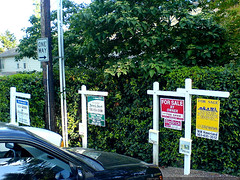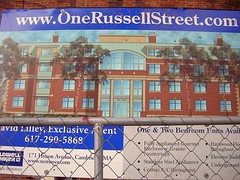Is promoting home ownership good policy? If so, this can help

Posted January 12, 2009 at 1:34PM
 There are quite a few people in my world, some I respect highly, who will argue that America's "fetish" with home ownership, particularly as fueled by the tax deduction for mortgage interest, promotes sprawl. The feds subsidize larger lots and larger sized homes, goes the argument, and promote inequality by providing the biggest subsidies to the people buying the most expensive (i.e., the largest) homes. Certainly, many will argue that the deduction is bad social policy, responsible for the foreclosure crisis and subsequent US financial collapse; libertarians dislike it because it favors one type of investment over another.
There are quite a few people in my world, some I respect highly, who will argue that America's "fetish" with home ownership, particularly as fueled by the tax deduction for mortgage interest, promotes sprawl. The feds subsidize larger lots and larger sized homes, goes the argument, and promote inequality by providing the biggest subsidies to the people buying the most expensive (i.e., the largest) homes. Certainly, many will argue that the deduction is bad social policy, responsible for the foreclosure crisis and subsequent US financial collapse; libertarians dislike it because it favors one type of investment over another.
"Federal tax policy has generally favored development on the periphery of cities. A striking example is the mortgage loan interest deduction," writes Richard Green of Southern Cal. "As long as homeownership is a fundamental part of the American dream, we won't have livable cities," says Daniel Lazare on Planetizen.  "Half the benefit of the deduction goes to the 12 percent of taxpayers who make at least $100 grand per year," notes a post by Clark Williams-Terry on Grist, citing an interesting piece by Roger Lowenstein in the New York Times Magazine.
"Half the benefit of the deduction goes to the 12 percent of taxpayers who make at least $100 grand per year," notes a post by Clark Williams-Terry on Grist, citing an interesting piece by Roger Lowenstein in the New York Times Magazine.
I've never been so sure of that, personally. My NRDC colleague and MacArthur laureate David Goldstein, for instance, promotes the location-efficient mortgage as a way to extend home ownership to people who wish to buy urban homes but cannot now afford them because of the erroneous way that lenders traditionally calculate what city dwellers can afford. David and his partner in the LEM, Scott Bernstein of the Center for Neighborhood Technology, contend that home ownership is a good thing that should be more prevalent among lower-income urban residents. NRDC's friends in Enterprise Community Partners and the Local Initiatives Support Corporation, which fund for-sale (as well as rental) affordable housing, would certainly agree.
 I've always thought that the desire to own a home and the tax policies that encourage ownership are generally neutral as to the location and form of the housing. My wife and I get roughly the same benefit for our transit-accessible city house as our relatives in the outer suburbs get for theirs. I think the main effect of repealing the mortgage deduction would not be to discourage sprawl (the market is already beginning to do that under current rules) but to lower the nominal price and value of all forms of for-sale housing, since demand at any given price point would go down (even more than it already has in the recession) compared to what it now is. New starts of high-end housing might be affected the most, but they are increasingly likely to be found in nonsprawling as well as sprawling locations.
I've always thought that the desire to own a home and the tax policies that encourage ownership are generally neutral as to the location and form of the housing. My wife and I get roughly the same benefit for our transit-accessible city house as our relatives in the outer suburbs get for theirs. I think the main effect of repealing the mortgage deduction would not be to discourage sprawl (the market is already beginning to do that under current rules) but to lower the nominal price and value of all forms of for-sale housing, since demand at any given price point would go down (even more than it already has in the recession) compared to what it now is. New starts of high-end housing might be affected the most, but they are increasingly likely to be found in nonsprawling as well as sprawling locations.
Making a strong case in favor of ownership, Rourke O'Brien and David Newville write in yesterday's Washington Post:
"Studies have shown that families who own their own homes are more likely to be involved in their communities, to report higher satisfaction with their lives, and to vote. Homeownership also has positive impacts on children, such as increased high school graduation rates, fewer behavioral problems and better job outcomes after school, and these effects have been found to be strongest among low-income homeowners.
"What's more, homeownership has been and will continue to be the single biggest source of wealth for low- and moderate-income families. Even if housing prices don't rise much, the forced saving that comes from paying down a mortgage can help families build equity that can
then be leveraged to finance a child's education, provide financial security in retirement or pass wealth on to the next generation."
O'Brien and Newville believe that shared-equity homeownership can be a tremendous asset in bringing higher rates of ownership to lower-income communities. They explain:
"Here's how it works: When a qualified family purchases a City First home [City First is a DC lender], they will receive a low-cost "silent" second 40-year mortgage on the home of up to $75,000, which reduces the size of the first or primary mortgage. In exchange for this subsidy, the homeowner must agree to share part of the appreciation with City First, which will use the funds to extend this subsidy to the next qualified buyer. This guarantees that every unit stays in the hands of working families who are otherwise shut out of homeownership in the District. It also keeps the program from requiring large amounts of new public and private funding each year."
Shared-equity lending apparently began as a way to help families effectively lower the costs to their adult children of purchasing first homes. This sounds like a really neat application of the idea.